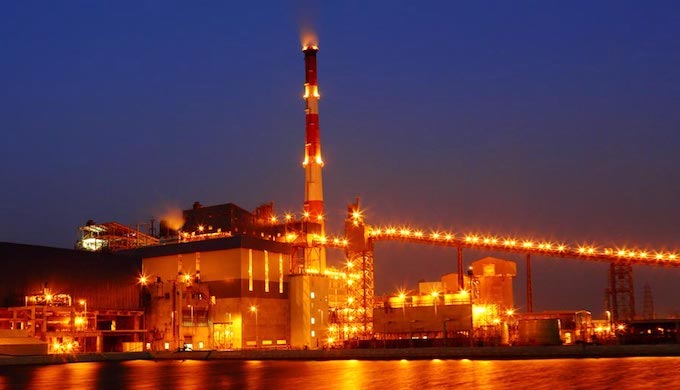Protests against the copper smelting plant in Thoothukudi in Tamil Nadu are expected to continue till the factory operated by Vedanta Resources is permanently shut down

Local residents holding a protest meeting in front of the Sterlite Copper factory gate in Thoothukudi (Photo by Foil Vedanta)
Order has been restored in Thoothukudi after police on May 22 gunned down at least 10 protestors agitating for the closure of a copper smelter, but it is the calm of a graveyard, an environmental activist said.
Residents of the southern port city, also known as Tuticorin, have been demanding closure of the copper factory for the past 100 days, and had announced their intention of undertaking a march to the Tuticorin District Collectorate office on Tuesday. Police fired at thousands of protesters marching to the Collectorate, killing at least 10 and wounding hundreds.
A citizens’ statement issued by the Environment Support Group, which works for environmental and social justice initiatives in India, blamed the government of Tamil Nadu, the federal environment ministry, the Tamil Nadu Pollution Control Board (TNPCB) and the Thoothukudi District Administration for allowing the situation to get out of hand. They have allowed “Vedanta Sterlite to violate environmental and land use planning laws with impunity for over two decades,” said the statement signed by prominent citizens including a former judge.
Pressure cooker
The recent protests and police firing on Tuesday cannot be seen in isolation, environmental activist Nityanand Jayaraman said. “It (the agitation) has been building up and the government has systematically refused to pay heed to the concerns of the people,” Jayaraman told indiaclimatedialogue.net. “The situation has been defused to the extend that there is peace, but it is the peace of a cemetery. Order has been restored but the pressure cooker has only gone back to simmer.”
Vedanta is allowed to continue operating the smelter because it has been lobbying hard with the government and has been making large financial contributions to political parties, he alleged. Civil society activists intend to hold a public inquest in the coming days to take a view on the matter, Jayaraman said.
There have been concerns about pollution over the copper smelter ever since it was commissioned in 1997. The plant was ordered closed by the Tamil Nadu government in March 2013 after a gas leak. The company moved the National Green Tribunal (NGT), which overturned the order and the plant started operating again. The state government took the case to the Supreme Court, which fined the company INR 1 billion (USD 14.7 million) but allowed it to operate. The apex court had at that time said the company had misrepresented facts.
Fresh protests erupted earlier this year when Vedanta Ltd, the owner of the Sterlite Copper factory and a subsidiary of the London Stock Exchange-listed Vedanta Resources, announced that it will double the capacity of the plant to produce 800,000 tonnes of copper every year through an expansion programme expected to cost INR 25 billion (USD 367.5 million).
Expansion halted
The Madurai bench of the Madras High Court on Wednesday stayed the expansion of Sterlite Copper’s industrial unit in Thoothukudi. The bench insisted that the company seek public consultation before expanding further.
Local residents around the plant have been agitating for the closure of the plant on the grounds that it caused heavy groundwater and seawater pollution by leaching of dangerous chemicals. The factory also causes heavy air pollution, they allege. The company has denied all charges.

The copper smelter plant in Thoothukudi at night (Photo by Vedanta Resources)
However, environmentalist Fathima Babu has said that several instances of pollution had been documented and cases had been filed against the Sterlite unit. Babu has filed a public interest litigation that seeks to quash the environmental clearance granted to the plant.
The state’s pollution watchdog in April rejected the application of Sterlite Copper that sought renewal of its consent to operate the plant. The company is contesting the rejection at the TNPCB’s appellate body, which is expected to hear the matter on June 6. The license to operate expired on March 31 but the plant was shut down a few days earlier for maintenance.
P. Ramnath, Chief Executive Officer of Sterlite Copper, had said in an interview in April that that demands to close down the plant is based on misrepresentation of facts. “Closing down of companies does not help the local economy,” he said. “We want to take forward the growth story of Tamil Nadu.” An email to the company with queries on pollution and proposed expansion plans remained unanswered.
Institutional weakness
The Sterlite copper plant has courted controversy since the beginning and has been closed multiple times in the past, according to Chandra Bhushan, Deputy Director General at Centre for Science and Environment (CSE), a New Delhi-based think tank. “Everybody knows that this plant is a polluting plant, people have contested this plant and still we have not been able to resolve this issue. This tells us about the institutional weakness in India to resolve environmental conflicts,” Bhushan told indiaclimatedialogue.net.
“It also shows that our regulatory agencies are absolutely inept and weak,” Bhushan said. “For 20 years, courts have been closing it, fines have been imposed and a number of cases have been filed against it. Regulatory agencies should have stepped in and closed the plant.”
Although Tuesday’s police action can be termed as a law and order issue, the trigger undoubtedly was the proposed expansion of the polluting plant, he said. “From the beginning, this plant has been flouting laws and there is enough documentary evidence,” Bhushan said. “This plant should be closed down.”
